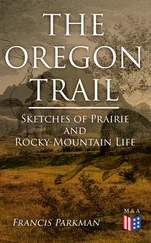Francis Parkman - Tte Oegon Trail
Здесь есть возможность читать онлайн «Francis Parkman - Tte Oegon Trail» весь текст электронной книги совершенно бесплатно (целиком полную версию без сокращений). В некоторых случаях можно слушать аудио, скачать через торрент в формате fb2 и присутствует краткое содержание. Жанр: Приключения про индейцев, Историческая проза, Прочая документальная литература, на английском языке. Описание произведения, (предисловие) а так же отзывы посетителей доступны на портале библиотеки ЛибКат.
- Название:Tte Oegon Trail
- Автор:
- Жанр:
- Год:неизвестен
- ISBN:нет данных
- Рейтинг книги:5 / 5. Голосов: 1
-
Избранное:Добавить в избранное
- Отзывы:
-
Ваша оценка:
- 100
- 1
- 2
- 3
- 4
- 5
Tte Oegon Trail: краткое содержание, описание и аннотация
Предлагаем к чтению аннотацию, описание, краткое содержание или предисловие (зависит от того, что написал сам автор книги «Tte Oegon Trail»). Если вы не нашли необходимую информацию о книге — напишите в комментариях, мы постараемся отыскать её.
Tte Oegon Trail — читать онлайн бесплатно полную книгу (весь текст) целиком
Ниже представлен текст книги, разбитый по страницам. Система сохранения места последней прочитанной страницы, позволяет с удобством читать онлайн бесплатно книгу «Tte Oegon Trail», без необходимости каждый раз заново искать на чём Вы остановились. Поставьте закладку, и сможете в любой момент перейти на страницу, на которой закончили чтение.
Интервал:
Закладка:
Not long after we came to a small trail leading to Fort Leavenworth, distant but one day's journey. Tete Rouge here took leave of us. He was anxious to go to the fort in order to receive payment for his valuable military services. So he and his horse James, after bidding an affectionate farewell, set out together, taking with them as much provision as they could conveniently carry, including a large quantity of brown sugar. On a cheerless rainy evening we came to our last encamping ground. Some pigs belonging to a Shawnee farmer were grunting and rooting at the edge of the grove.
"I wonder how fresh pork tastes," murmured one of the party, and more than one voice murmured in response. The fiat went forth, "That pig must die," and a rifle was leveled forthwith at the countenance of the plumpest porker. Just then a wagon train, with some twenty Missourians, came out from among the trees. The marksman suspended his aim, deeming it inexpedient under the circumstances to consummate the deed of blood.
In the morning we made our toilet as well as circumstances would permit, and that is saying but very little. In spite of the dreary rain of yesterday, there never was a brighter and gayer autumnal morning than that on which we returned to the settlements. We were passing through the country of the half-civilized Shawanoes. It was a beautiful alternation of fertile plains and groves, whose foliage was just tinged with the hues of autumn, while close beneath them rested the neat log-houses of the Indian farmers. Every field and meadow bespoke the exuberant fertility of the soil. The maize stood rustling in the wind, matured and dry, its shining yellow ears thrust out between the gaping husks. Squashes and enormous yellow pumpkins lay basking in the sun in the midst of their brown and shriveled leaves. Robins and blackbirds flew about the fences; and everything in short betokened our near approach to home and civilization. The forests that border on the Missouri soon rose before us, and we entered the wide tract of shrubbery which forms their outskirts. We had passed the same road on our outward journey in the spring, but its aspect was totally changed. The young wild apple trees, then flushed with their fragrant blossoms, were now hung thickly with ruddy fruit. Tall grass flourished by the roadside in place of the tender shoots just peeping from the warm and oozy soil. The vines were laden with dark purple grapes, and the slender twigs of the maple, then tasseled with their clusters of small red flowers, now hung out a gorgeous display of leaves stained by the frost with burning crimson. On every side we saw the tokens of maturity and decay where all had before been fresh and beautiful. We entered the forest, and ourselves and our horses were checkered, as we passed along, by the bright spots of sunlight that fell between the opening boughs. On either side the dark rich masses of foliage almost excluded the sun, though here and there its rays could find their way down, striking through the broad leaves and lighting them with a pure transparent green. Squirrels barked at us from the trees; coveys of young partridges ran rustling over the leaves below, and the golden oriole, the blue jay, and the flaming red-bird darted among the shadowy branches. We hailed these sights and sounds of beauty by no means with an unmingled pleasure. Many and powerful as were the attractions which drew us toward the settlements, we looked back even at that moment with an eager longing toward the wilderness of prairies and mountains behind us. For myself I had suffered more that summer from illness than ever before in my life, and yet to this hour I cannot recall those savage scenes and savage men without a strong desire again to visit them.
At length, for the first time during about half a year, we saw the roof of a white man's dwelling between the opening trees. A few moments after we were riding over the miserable log bridge that leads into the center of Westport. Westport had beheld strange scenes, but a rougher looking troop than ours, with our worn equipments and broken-down horses, was never seen even there. We passed the well- remembered tavern, Boone's grocery and old Vogel's dram shop, and encamped on a meadow beyond. Here we were soon visited by a number of people who came to purchase our horses and equipage. This matter disposed of, we hired a wagon and drove on to Kansas Landing. Here we were again received under the hospitable roof of our old friend Colonel Chick, and seated on his porch we looked down once more on the eddies of the Missouri.
Delorier made his appearance in the morning, strangely transformed by the assistance of a hat, a coat, and a razor. His little log-house was among the woods not far off. It seemed he had meditated giving a ball on the occasion of his return, and had consulted Henry Chatillon as to whether it would do to invite his bourgeois. Henry expressed his entire conviction that we would not take it amiss, and the invitation was now proffered, accordingly, Delorier adding as a special inducement that Antoine Lejeunesse was to play the fiddle. We told him we would certainly come, but before the evening arrived a steamboat, which came down from Fort Leavenworth, prevented our being present at the expected festivities. Delorier was on the rock at the landing place, waiting to take leave of us.
"Adieu! mes bourgeois; adieu! adieu!" he cried out as the boat pulled off; "when you go another time to de Rocky Montagnes I will go with you; yes, I will go!"
He accompanied this patronizing assurance by jumping about swinging his hat, and grinning from ear to ear. As the boat rounded a distant point, the last object that met our eyes was Delorier still lifting his hat and skipping about the rock. We had taken leave of Munroe and Jim Gurney at Westport, and Henry Chatillon went down in the boat with us.
The passage to St. Louis occupied eight days, during about a third of which we were fast aground on sand-bars. We passed the steamer Amelia crowded with a roaring crew of disbanded volunteers, swearing, drinking, gambling, and fighting. At length one evening we reached the crowded levee of St. Louis. Repairing to the Planters' House, we caused diligent search to be made for our trunks, which after some time were discovered stowed away in the farthest corner of the storeroom. In the morning we hardly recognized each other; a frock of broadcloth had supplanted the frock of buckskin; well-fitted pantaloons took the place of the Indian leggings, and polished boots were substituted for the gaudy moccasins.
After we had been several days at St. Louis we heard news of Tete Rouge. He had contrived to reach Fort Leavenworth, where he had found the paymaster and received his money. As a boat was just ready to start for St. Louis, he went on board and engaged his passage. This done, he immediately got drunk on shore, and the boat went off without him. It was some days before another opportunity occurred, and meanwhile the sutler's stores furnished him with abundant means of keeping up his spirits. Another steamboat came at last, the clerk of which happened to be a friend of his, and by the advice of some charitable person on shore he persuaded Tete Rouge to remain on board, intending to detain him there until the boat should leave the fort. At first Tete Rouge was well contented with this arrangement, but on applying for a dram, the barkeeper, at the clerk's instigation, refused to let him have it. Finding them both inflexible in spite of his entreaties, he became desperate and made his escape from the boat. The clerk found him after a long search in one of the barracks; a circle of dragoons stood contemplating him as he lay on the floor, maudlin drunk and crying dismally. With the help of one of them the clerk pushed him on board, and our informant, who came down in the same boat, declares that he remained in great despondency during the whole passage. As we left St. Louis soon after his arrival, we did not see the worthless, good-natured little vagabond again.
Читать дальшеИнтервал:
Закладка:
Похожие книги на «Tte Oegon Trail»
Представляем Вашему вниманию похожие книги на «Tte Oegon Trail» списком для выбора. Мы отобрали схожую по названию и смыслу литературу в надежде предоставить читателям больше вариантов отыскать новые, интересные, ещё непрочитанные произведения.
Обсуждение, отзывы о книге «Tte Oegon Trail» и просто собственные мнения читателей. Оставьте ваши комментарии, напишите, что Вы думаете о произведении, его смысле или главных героях. Укажите что конкретно понравилось, а что нет, и почему Вы так считаете.












